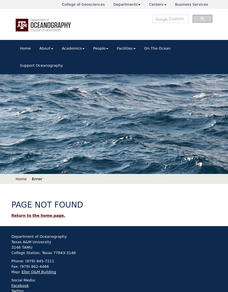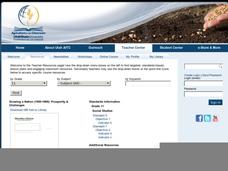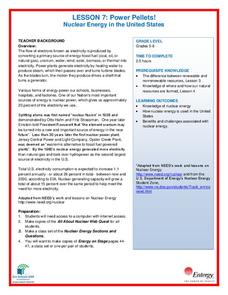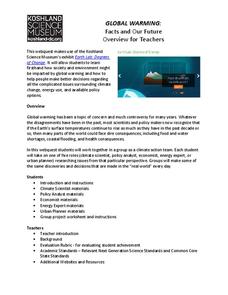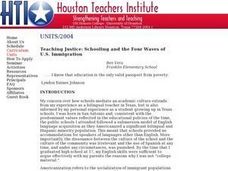Curated OER
The Supreme Court: The Judicial Power of the United States
Students investigate some basic facts about the Supreme Court by examining the United States Constitution and one of the landmark cases decided by that court. The operation of the Supreme Court forms the focus of the lesson.
Agriculture in the Classroom
Growing a Nation (1930-1949): From Defeat to Victory, Lesson 2
Using primary source materials including radio broadcasts, films, and interview transcripts, history young scholars gain a better understanding of the Dust Bowl, relief efforts for farmers, and the nation's agricultural past. It includes...
Curated OER
United States Government 5th Grade
In this review of United States government worksheet, 5th graders recall facts and answer multiple choice questions. Students answer 25 questions.
Curated OER
Tech-Lab Station--Introduction of Unit
In this lesson, students are introduced to a unit Students discuss a unit as a group and interest is generated. Good suggestions for sparking students' interest in general and the value of student discussion are given.
Humanities Texas
Primary Source Worksheet: Excerpt from Reagan's Speech to the National Association of Evangelicals
Ronald Reagan's 1983 speech to the National Association of Evangelicals (also know as the "Evil Empire Speech") offers readers with an opportunity to practice their skills at reading informational text, specifically primary source...
Curated OER
2005 U.S. National Chemistry Olympiad - Local Section Exam
National Chemistry Olympiad tests are released after their use each year, since they cannot use them again for this event. The result: outstanding comprehensive assessment resources for general chemistry classes! This 2005 version covers...
Agriculture in the Classroom
Growing a Nation (1950-1969): Prosperity & Challenges: The Story of American Agriculture
A wonderful instructional activity on the development and impact of mechanized farming! History or agriculture classes learn the historical background of the United States' food production by creating a pamphlet with information on...
Humanities Texas
Primary Source Worksheet: General Washington, Letter Declaring Acceptance of the Command of the Armies of the United States
Discover what influenced president George Washington's decision in his early career to command the United States army by analyzing his formal acceptance with this primary source analysis worksheet.
National Wildlife Federation
Power Pellets! Nuclear Energy in the United States
Nuclear power provides about 20 percent of the energy generated in the United States. The seventh activity in the series of 12 tackles nuclear power. After sharing what they know about nuclear energy, scholars complete a...
National WWII Museum
What It Takes to Win: Mapping Primary Source Evidence
World War II was not just waged in Europe and Asia; the home front was key to Allied victory. Using newspaper clippings from World War II and a map, scholars plot out wartime production in the United States. After that, class members...
Smithsonian Institution
George Washington: A National Treasure
Uncover the answer to a specific clue in a portrait of George Washington with a spyglass in an Internet-based interactive. Learners read a clue to an item hidden in a portrait of the First President of the United States in the last years...
Library of Congress
Thomas Jefferson's Library: Making the Case for a National Library
The United States Library of Congress, the largest library in the world. But such was not always the case. The library was destroyed during the War of 1812. In a persuasive letter to Samuel H. Smith, Thomas Jefferson offered to sell his...
Community Colleges of Los Angeles
Seeking Refuge: Understanding Refugees in Canada
What if you had no choice but to leave everything behind and seek asylum elsewhere? Do countries have an obligation to accept refugees? To gain an understanding of the complexity of the issues of refugee rights, class members first...
EngageNY
Grade 10 ELA Module 2: Unit 3, Lesson 2
Is good good enough? Scholars examine claims made in a speech by Elanor Roosevelt. Roosevelt claims that people should adopt the Universal Declaration of Human Rights because it is a good document. Readers discuss their ideas in pairs,...
Curated OER
How Did Slavery Impact Our Nation?
Fifth graders closely examine the effects of slavery on American society giving special emphasis to the issue of social injustice, the life of Harriet Tubman, the underground railroad and the achievements of Abraham Lincoln during this...
Curated OER
Classroom Unity Representing a Nation of Immigrants
Investigate national unity in a month-long instructional activity. After creating "I am from" poems, 5th graders will construct accordion flip books, listing and illustrating reasons for settlement. Choosing illustrations, essays, or...
Curated OER
The Debate in the United States over the League of Nations
Eleventh graders read the words and listen to the voices of some central participants in the debate over the League of Nations.
Curated OER
The People and Philosophy Behind Our National Parks: A Biographical Curriculum Unit
Students discover the interaction of American Literature, politics and the environmental movement. They explore the changing concept and philosophy of wilderness, and explain the development of The National Park System. They read...
Curated OER
Regionalism as Seen Through the National Parks
Fifth graders see a video of some of our country's national parks. As each one is introduced they write down its name and location and star* the areas they find unique and interesting. After the video is over they share at least one of...
Curated OER
Is A Nation Always A Region?
Pupils define the term, "nation," and analyze the boundaries established in Africa by colonial powers. In small groups, they participate in a simulated United Nations, develop a list of questions, analyze the nations of Africa, and...
Curated OER
Nationalities 2
In this nationalities review worksheet, students practice their vocabulary skills as they identify the countries that match each of the nationalities listed. For example, students should respond United States for the nationality American.
National Academy of Sciences
Global Warming: Facts and Our Future
According to the United Nations, climate change affects every country on the planet. This research project encourages scholars to explore the factors that affect climate change from different perspectives: climate scientist, policy...
Curated OER
Teaching Justice: Schooling and the Four Waves of U.S. Immigration
U.S. immigration is the focus of a unit on social justice. Over the course of a school year, young historians read a variety of texts to learn about four waves of immigration that have occurred over time in the U.S. An emphasis on...
Curated OER
Oil Dependency Among Nations
Students research oil dependency amongst different nations in the world. In this oil dependency lesson plan, students use maps to locate oil sources, consider government actions on oil, and predict U.S. oil dependency.





